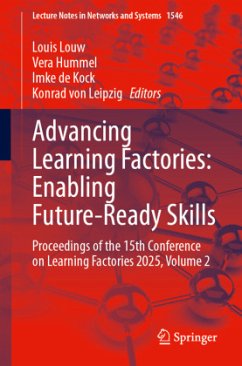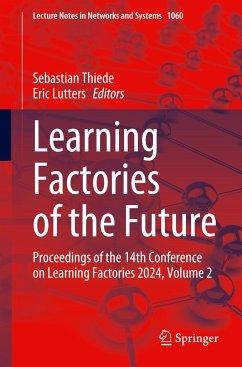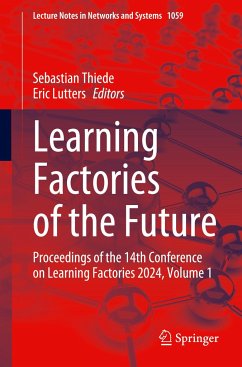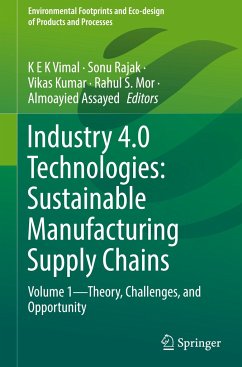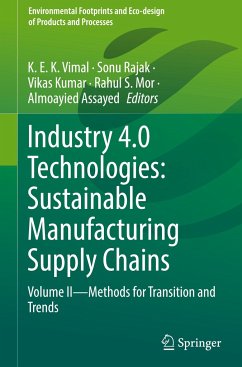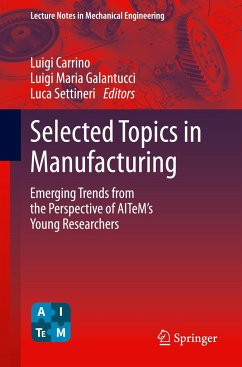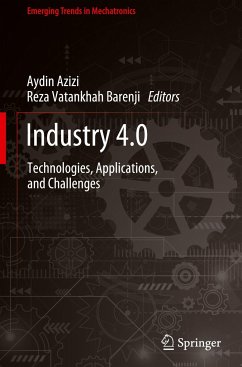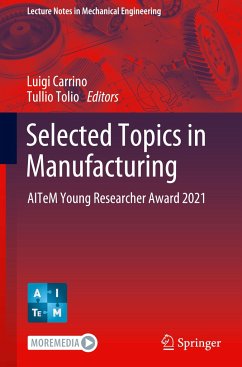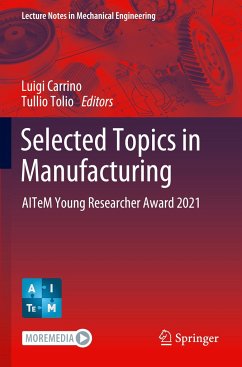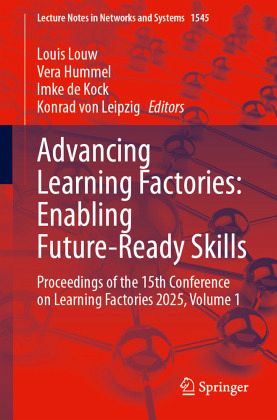
Advancing Learning Factories: Enabling Future-Ready Skills
Proceedings of the 15th Conference on Learning Factories 2025, Volume 1
Herausgegeben: Louw, Louis; Hummel, Vera; de Kock, Imke; von Leipzig, Konrad

PAYBACK Punkte
76 °P sammeln!
Industrial companies aim to offer unique products and service bundles to their customers. At the same time, they must shape their value-adding processes to address current challenges such as digitalization, intelligent systems, resilience, human-centredness, and sustainability. Managing these necessary transition processes relies heavily on staff competency. Ultimately, well-prepared students, qualified engineers, and workers must plan and implement the required steps. Qualification processes must be oriented towards these practical requirements. Thus, appropriate learning systems for developi...
Industrial companies aim to offer unique products and service bundles to their customers. At the same time, they must shape their value-adding processes to address current challenges such as digitalization, intelligent systems, resilience, human-centredness, and sustainability. Managing these necessary transition processes relies heavily on staff competency. Ultimately, well-prepared students, qualified engineers, and workers must plan and implement the required steps. Qualification processes must be oriented towards these practical requirements. Thus, appropriate learning systems for developing the competencies needed to set up and operate new production processes are crucial for the factory of the future.
Learning factories are recognized as a promising path to meet these future needs. They provide an interactive learning environment where pilot or real-scale processes and technologies are in place, allowing direct access to the product creation process (product development, manufacturing, quality management, logistics). Learning factories are based on a didactical concept that emphasizes experimental and problem-based learning. The continuous improvement philosophy is facilitated by the participants own actions and interactive involvement.
Through the learning factory, various stakeholders can grasp the complex technical and organizational interrelationships of today s industrial environment and acquire the competencies to systematically improve it. The Conference on Learning Factories (CLF) provides a regular platform for academic, educational, and industrial stakeholders to exchange the latest knowledge and developments in this domain.
The Conference on Learning Factories (CLF) is the annual conference of the International Association of Learning Factories (IALF), attracting top academics and researchers in the field of learning factories to meet, engage, and share their R&D findings. The goal of the CLF is to promote cooperation among members to achieve excellence in teaching and research in the field of learning factories. Each year, the conference attracts about 130 participants worldwide.
The 15th Conference on Learning Factories (CLF) was hosted by the Department of Industrial Engineering at Stellenbosch University, in the beautiful town of Stellenbosch, South Africa. The conference covered the following main topics: technology implementation and evaluation related to learning factories, learning and didactic processes and evaluation related to learning factories, learning factory business models and cooperation (industry and academic), learning factory concepts and infrastructure, and learning factories for sustainability and resilience.
Learning factories are recognized as a promising path to meet these future needs. They provide an interactive learning environment where pilot or real-scale processes and technologies are in place, allowing direct access to the product creation process (product development, manufacturing, quality management, logistics). Learning factories are based on a didactical concept that emphasizes experimental and problem-based learning. The continuous improvement philosophy is facilitated by the participants own actions and interactive involvement.
Through the learning factory, various stakeholders can grasp the complex technical and organizational interrelationships of today s industrial environment and acquire the competencies to systematically improve it. The Conference on Learning Factories (CLF) provides a regular platform for academic, educational, and industrial stakeholders to exchange the latest knowledge and developments in this domain.
The Conference on Learning Factories (CLF) is the annual conference of the International Association of Learning Factories (IALF), attracting top academics and researchers in the field of learning factories to meet, engage, and share their R&D findings. The goal of the CLF is to promote cooperation among members to achieve excellence in teaching and research in the field of learning factories. Each year, the conference attracts about 130 participants worldwide.
The 15th Conference on Learning Factories (CLF) was hosted by the Department of Industrial Engineering at Stellenbosch University, in the beautiful town of Stellenbosch, South Africa. The conference covered the following main topics: technology implementation and evaluation related to learning factories, learning and didactic processes and evaluation related to learning factories, learning factory business models and cooperation (industry and academic), learning factory concepts and infrastructure, and learning factories for sustainability and resilience.



